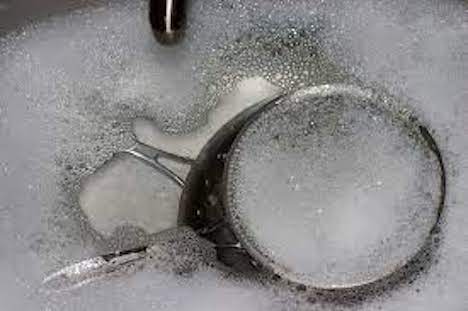Operation Inspiration
Occasionally I get people asking me Kashrus questions, and if it’s above my paygrade, I call in reinforcements from a friend who is a Rav and Posek. Before I go to him, I ask the pertinent questions since I know which things can help make things easier. And here’s where I’m going to do. I’m going to give you a tip that if you follow, you will more than likely thank me at some point down the road.
I call it: pre-emptive cleansing. Here’s how it works: The minute you have a dirty dish that you are going to put in the sink, add soap, them warm (but not hot) water. Then soak it until you’re ready to wash it. Even if you’re going to put it in the dishwasher later, it’s a good idea. And speaking of dishwashers, when you fill them, put some extra soap straight into the machine, not just into the detergent compartment with the trap door.
OK, you’re asking why I suggest this. Well, the soap will enable a Rav to identify a leniency based on the taste of the food being negatively affected by the soap. This will lead to a lot fewer cases requiring kashering or maybe even throwing away items. I’ll leave it to your Rav to work with you on that but take my word for it, please. But it doesn’t stop there.
Without getting too graphic, the same rule applies to the porcelain garbage disposal in your home. Sometimes when you have a food that is too wet for the garbage can, yet too thick to go down the sink, and you don’t have an actual garbage disposal in your sink, you may tote the pot down the hall and flush your cares away. Often, there will be a ring around the bowl. Don’t let it sit! Grab a toilet brush and wipe away the mess immediately. If you don’t, it will be much harder to clean later. (The same applies to non-food items.)
In fact, when you finish your cholent on Shabbos afternoon, toss that crockpot in the sink with soap and cold water. It will prevent any unpleasant odors and make it easier to clean when you’re ready. The point is, soaking things right away instead of letting them harden and get stuck-on is a great idea in nearly every situation.
OK, that’s helpful, but my name isn’t Heloise and I’m not usually giving household hints. What’s going on? Ah, therein lies of the beauty of being an “observant Jew,” and being m’dama milsa l’milsa, comparing two things.
Sure, I’ve spoken about ensuring you pre-empt any treifing up of your pots and pans and making sure you can clean up more easily later, but what’s that got to do with my life as a Jew? I’m glad you asked.
This lesson goes far beyond simple pots and pans. It extends to forks too, but not the culinary kind. We make choices all the time, and sometimes when we come to a fork in the road, we may make the wrong choice. The trick to getting out of it is to not let the mistake sit and become more ingrained in you.
If you get off the highway at the wrong exit, the best solution is to get right back on the highway and go where you’re supposed to. But if you want to be an akshan, you will stubbornly drive down the road you took incorrectly, and wind up further afield than you would have been had you simply turned around immediately.
If you say something wrong or hurt someone, don’t let it sit there and harden. Apologize as soon as you can and soften the blow. Don’t get set in your ways and tell yourself you’re correct and righteous. Admitting your mistakes makes it easier to recover from them.
If you’ve sinned, the same thing applies. Remind yourself that this is NOT who you are, and take some water (i.e. Torah) and start soaking away the stains. Find ways to ensure you nullify the sins or at least make them repulsive to yourself, sort of like the soap in the pot we spoke of earlier.
In fact, soaking in advance can help as well. When you buy wood, you can purchase it “treated.” As it was explained to me, though I did not have the extreme interest to actually research this, the treated wood has been allowed to soak in water until it’s saturated and then getting wet doesn’t affect it. It’s so full that it can’t take in more water.
The same can work for us. If we immerse ourselves in Torah and Kedusha, chesed and shmiras halashon, then when we do slip up, it won’t affect us as deeply and we can clean it away pretty easily. That’s because we’re so full of goodness that the sins can’t stick. (Hmmm… maybe I can become the Teflon Jon…)
There’s no one who is so perfect that they haven’t done anything wrong, but we can take steps to make sure that when we do, we’re able to pick ourselves up, brush ourselves off, and once again become the shining examples of humankind that we should be.
© 2021 – All Rights Reserved
Did you enjoy this column? Feedback is welcome and appreciated. E-mail HYPERLINK “mailto:info@JewishSpeechWriter.com” info@JewishSpeechWriter.com to share your thoughts. You never know when you may be the lamp that enlightens someone else.
